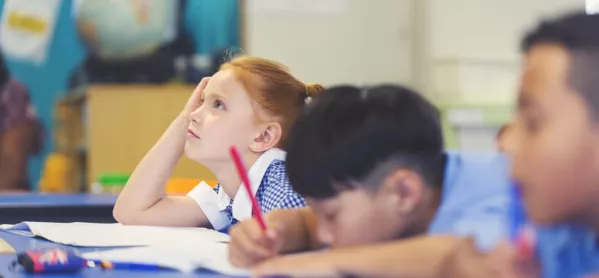Catch-up: Primaries ‘should focus on Year 3’

Pupils in Year 3 have been hit particularly hard by the Covid pandemic, with a steeper drop in learning than older primary schoolchildren, research shows.
An analysis of teacher assessments from more than half a million pupils also suggests that the pandemic has delayed the educational recovery of pupils in this year group more than children in the years above.
The findings come in a new report exploring what percentage of pupils are achieving or exceeding in terms of what is expected for their age, among children who were in primary school at the start of the pandemic.
- Leader: Schools need stability after Covid but they won’t get it
- Covid: Scale of regional learning loss revealed
- Catch-up: Teachers warn of an 18-month learning gap
The analysis shows that pupils in Year 3 - whose only year of uninterrupted education before Covid was in Reception - have been the hardest hit.
Covid catch-up: How Year 3 have been hit hardest by learning loss
Headteachers warn that the Covid disruption over the past two years means that these children have not had the opportunity to “rehearse the routines, skills and social aspects of learning which they normally develop in key stage 1”, says the report, by the company Juniper Education.
The report says that nearly one in three Year 3 children involved in the research has not met age-related expectations in reading, writing or maths, compared with around just one in five before the pandemic.
In the autumn of 2019, the company’s research found that 82 per cent of Year 3 pupils achieved age-related expectations in reading, 79 per cent in writing and 83 per cent in maths.
Two years later, these figures have dropped to 68 per cent, 58 per cent and 69 per cent respectively.
Frazer Westmorland, headteacher of Mundella Primary School in Kent, said: “The huge disruption of the pandemic means that many children haven’t had the opportunity to rehearse the routines, skills and social aspects of learning which they normally develop in key stage 1.
“So by the time those children reach the middle years of primary school, they are struggling to find their feet.
“This report provides a strong evidence base from which schools can direct their strategy and resources to support the pupils in greatest need and help them make the most of the years ahead.”
The report shows not only has younger children’s learning suffered the most during the pandemic, but it is also yet to show signs of recovery.
It adds: “The number of Year 3 pupils working at age-related expectations has fallen progressively from pre-pandemic levels right through to autumn 2021.”
Positive signs for older year groups
However, there are some signs of improvement in older year groups, with a slight uplift in attainment during the autumn term.
Year 6 reading attainment increased from 70 per cent in summer 2021 to 73 per cent in autumn 2021.
Year 6 writing attainment rose from 60 per cent in summer 2021 to 63 per cent in autumn 2021, and maths attainment went up from 67 per cent to 70 per cent in the same period.
The SEND gap widens
The report also warns that the pandemic appears to have led to gaps widening between children with special educational needs and disabilities (SEND) and their classmates, particularly in Year 3.
In 2019, the attainment gap in reading between Year 3 pupils with SEND and their peers was 29 percentage points. Two years later, this gap has grown to 45 percentage points among this year’s cohort.
Writing suffers the most
Of the three core primary subjects, writing appears to be the one that has been impacted the most during the pandemic.
Data in the report shows that across all four year groups in the study, there were steeper drops in writing than in reading or maths. The biggest fall in writing attainment was for Year 3.
Report author and former primary head Stephan Nicholls, who works as an education consultant for Juniper Education, said: “The past two years have been exceptionally disruptive to children’s education, and Year 3 children - whose last normal year of schooling was when they were in Reception - have suffered the most from the pandemic.
“While the report brings sobering news, there are glimmers of hope that older children are already taking the first steps towards recovery in their attainment.”
The Juniper Education National Dataset Report, March 2022 - The impact of the Covid-19 pandemic on primary school children’s learning examines teacher assessment data from more than 6,000 primary schools.
You need a Tes subscription to read this article
Subscribe now to read this article and get other subscriber-only content:
- Unlimited access to all Tes magazine content
- Exclusive subscriber-only stories
- Award-winning email newsletters
Already a subscriber? Log in
You need a subscription to read this article
Subscribe now to read this article and get other subscriber-only content, including:
- Unlimited access to all Tes magazine content
- Exclusive subscriber-only stories
- Award-winning email newsletters



